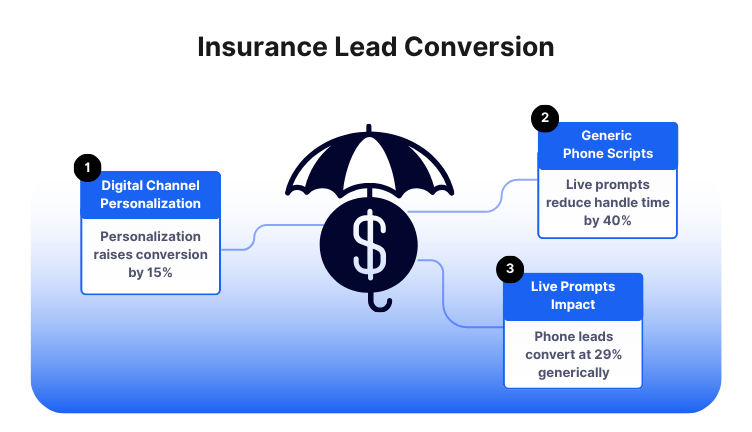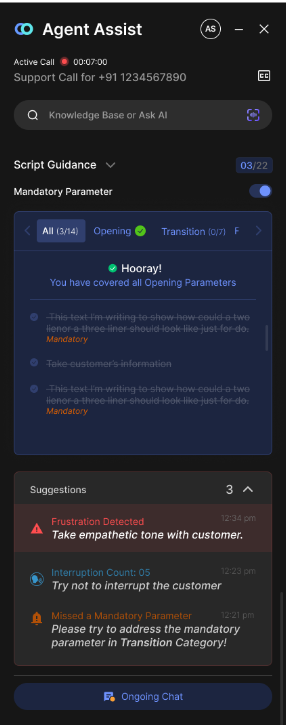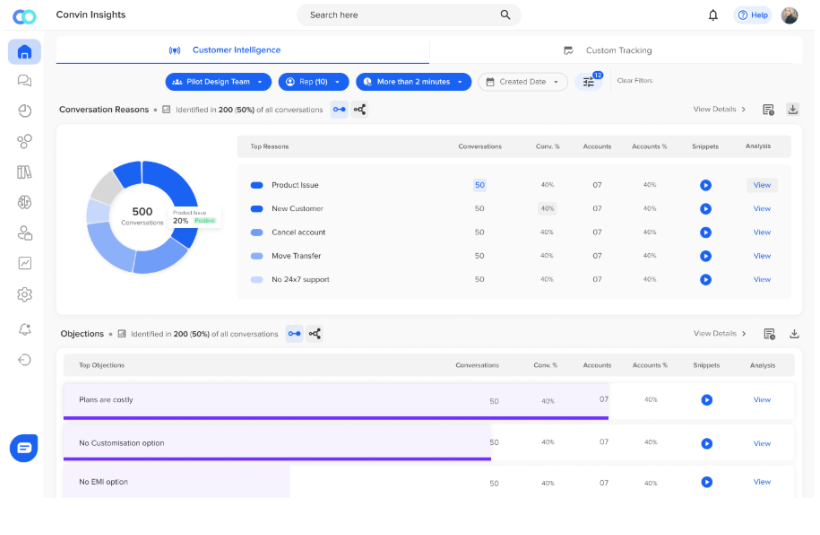Insurance sales don’t collapse because of poor products, they collapse because of poor qualification. In multi-channel distribution models like POSP and bancassurance, up to 58% of leads are never followed up due to inefficient routing and unprioritized queues.
In a market where timing and context shape conversion, every lag, mismatch, or generic interaction costs you more than a sale; it breaks trust with the channel.
This blog breaks down how AI-led qualification addresses the invisible leaks in your system. You'll see how smart routing, real-time prompts, and intent-based discovery scripts reshape qualification across POSP, bancassurance, and digital channels.
Expect scripts tailored for your agents, stats that actually matter, and a product-first view into how Convin delivers performance at scale, without gimmicks or guesswork.
See how AI rewrites qualification for POSP and bancassurance teams
How AI Lead Qualification Solves the POSP and Bancassurance Problem
In channels like POSP and bancassurance, every hour of delay erodes lead intent. Studies show that responding to a lead within five minutes gives you up to 21 × higher qualification odds compared to waiting 30+ minutes.
Yet many insurers still route leads manually and uniformly, with no channel nuance, no agent‑match, and a high risk of drop‑offs. When you combine mixed lead quality with slow routing, the result is wasted cost and missed meetings.
By placing AI at the heart of your qualification, you tackle both speed and precision.
1. AI in Insurance Qualification: Solving Lead Drop-Offs And No-Shows
Leads in the POSP and bancassurance channels often lose momentum long before your agent ever connects. According to Convin, lead qualification automation can drive a 21% increase in sales by cutting idle time and wasted touches.
But it’s not just about speed. The qualification engine must assess intent, channel‑fit, and agent match instantly. In channels with shared leads and multiple handoffs, the lag and mismatch cause drop‑offs.
A deliberate AI qualification system filters out low‑fit leads and elevates high‑intent ones, routing them without delay.
By tackling both lead quality and routing latency, AI lead qualification turns “maybe contacted” into “promptly engaged”, drastically reducing no‑shows and waste.
2. Traditional Lead Qualification Is Broken in POSP & Bancassurance
In many partner‑distribution setups, leads flow into a generic pool and sit until an agent picks them up. Research shows only 19% of web leads in insurance are called back within one hour, and that delay kills conversion potential.
Such static routing ignores channel nuance: a lead from a bank‑partner branch may require a different discovery script than one from a digital aggregator. Agents operate from generic assumptions, increasing wasted touches and low conversion.
The simple fix? A qualification layer that tags channel origin and adjusts routing logic accordingly.
Legacy qualification workflows cost you because they don’t respect channel differences. AI lead qualification corrects that by making every lead fit for the right agent from the start.
3. Smart Skill-Based Routing vs Generic Lead Routing
Imagine two leads: one from a POSP servicing high‑net‑worth clients, the other from a digital aggregator of first‑time policy‑buyers. Generic lead routing treats them the same. Skill‑based routing does not.
Convin’s data shows that automating lead routing frees up to 60% of the qualification process and ensures routing aligns with agent strengths.
With AI, you map agent performance history, channel type, and product expertise, then assign leads accordingly. The result: better agent‑lead fit, higher engagement, fewer drops.
Moving from “first available agent” to “best matched agent” is what converts leads to meetings. AI lead qualification makes this possible.
Route high-value leads based on agent skills with Convin AI.

Boosting Insurance Sales Agents with Channel-Specific AI Playbooks
Whether your lead came via a bank’s partner branch, a POSP, or a digital channel, the discovery conversation needs to match the channel. Generic scripts cost time; lost meetings cost revenue. Data shows that financial services leads converted via phone have only 29% conversion rates when handled like generic leads.
With AI in place, your sales agents get channel‑specific scripts, live prompts, and context‑aware discovery flows, so they’re not just contacting leads fast, but talking to them right.
1. How an AI Insurance Sales Agent Uses Channel-Specific Scripts
Different channels demand different discovery flows. A lead from a bancassurance partner may be more financially literate; a POSP lead might need more education. AI can dynamically deliver scripts matching channel context.
Convin’s conversational‑AI solutions combine live prompts that adjust mid‑call, enabling agents to stay relevant and responsive.
By using channel‑specific scripts, agents spend less time guessing and more time uncovering genuine intent.
Channel‑specific script delivery via AI ensures agents steer the qualification conversation instead of stumbling through generic questions.
2. Role of AI in insurance: Custom discovery for each channel
Discovery is not a one‑size‑fits‑all step. The questions you ask a digital lead differ from those you ask a bank‑walk‑in or POSP‑referral. AI tailors the discovery flow in real time, asking the right questions, capturing context, and routing accordingly.
Third‑party benchmarks show that personalized interactions raise conversion by up to 15% in digital‑heavy insurance channels.
When AI qualifies and routes based on those customised flows, your agents start with a higher‑intent lead and a clear path forward.
Custom discovery driven by AI supports better qualification, faster conversion, and a stronger agent‑first engagement model.
3. Using live prompts to guide conversions in real time
During a live call, the agent needs more than a script: they need cues. Live prompts show what to say next, when to ask deeper questions, and how to handle objections, all tuned to channel context.
Convin reports a 40% reduction in average handle time when agents use real‑time prompts. Agents working with live prompts deliver a smoother, more consistent experience across channels, and that means fewer drop‑offs.
Real‑time prompts = real‑time control. AI lead qualification doesn’t just hand off lea;s, it empowers agents to close them.
Empower every agent with real-time prompts using Convin
This blog is just the start.
Unlock the power of Convin’s AI with a live demo.

Maximizing Insurance Lead Scoring Conversion with AI
Lead scoring is only as effective as the data feeding it, and the speed with which you act. Across industries, average conversion rates languish at 2‑5% unless leads are both qualified and routed quickly.
For insurers using multiple partner channels, the mix of “good” and “poor” leads is high, and routing latency is a persistent bottleneck.
AI‑driven scoring aligned with instant routing ensures the right lead hits the right agent at the right moment, boosting conversion and reducing waste.
1. AI lead qualification insurance tools for faster prioritization
Lead scoring is meaningless if the lead sits in a queue. AI‑based qualification tools integrate scoring and routing to prioritise leads on the fly, no manual backlog, no mis‑prioritisation.
Convin’s solution shows that automating scoring and qualification enables teams to handle high volumes without lowering quality.
By filtering and prioritising leads early, your distribution team focuses only on leads with real conversion potential. Faster lead prioritisation via AI turns volume pressure into win‑rate improvement.
2. Predicting Success With Insurance Lead Scoring Conversion Data
What signals matter when predicting conversion? AI models ingest voice‑tone patterns, response times, channel data, and historical outcomes. For instance, agencies report a 30‑40% increase in conversion when using high‑quality lead signals.
Convin’s analytics show that combining behavioral and contextual data leads to cleaner hand‑offs and more meetings kept.
Predictive scoring powered by AI isn’t a nice‑to‑have; it’s a conversion multiplier for channel‑heavy insurance distribution.
3. Reducing lag with instant routing and qualification
When a lead arrives, the routing lag often leads to a no-show. Studies show responding within minutes massively improves connection rates.
Convin automates qualification and routing so your agents start the call instead of prepping it. The outcome: fewer leads cooling down, fewer drop‑outs.
Start routing high-intent leads in seconds with Convin’s AI
How Convin Powers Channel-Specific AI Lead Qualification
Markets for insurance distribution increasingly reward those who treat each channel as unique. According to industry findings, agencies that implement intelligent lead‑quality assessment tools see a 30‑40% increase in conversion within a quarter.
When your tools combine skill‑based routing, live agent prompts, and analytics-driven lead scoring, you stop fighting chaos and start controlling conversion. That’s exactly the role that Convin fulfils at the qualification stage.

1. Real-time Agent Assist: Live Prompts And Scripts for Each Channel
Convin’s Real‑Time Agent Assist module is built to recognise which channel the lead came from, deliver the right script, and provide live support. The result: agents talk to leads in the context they expect.
According to Convin, their deployments have yielded up to 10× conversion lift in some cases. For partnership and distribution heads, this means the same agent pool can handle leads from multiple channels with tailored finesse.
Real‑time assist removes the manual burden of “which script do I use?” and replaces it with “which questions drive this channel’s discovery?”
2. Contact center intelligence for skill-based lead routing
Convin’s conversation intelligence analyzes past agent performance and aligns agents with leads they’ll succeed on. The outcomes: improved match, less waste, and more retained meetings.
For distribution networks with diverse agents (POSP, bank‑staff, digital), this means each lead gets the right human with the right skillset.
Skill‑based routing powered by AI lead qualification ensures leads don’t just get called, they get called by the person who can convert them.

3. Voice of customer + call analytics = lead scoring conversion boost
Convin merges voice analytics and customer feedback to spot what works in real conversations: which questions convert, what silence means, and which channels perform best. Their models show a 25% lift in conversion when using these insights. Convin
This continuous loop improves your scripts, your routing, and your agent training, resulting in better-qualified leads and fewer missed meetings.
Leverage call analytics insights with Convin and refine the qualification script
Fix Lead Quality and Speed with AI Lead Qualification
Most qualification systems weren’t built for the complexity of POSP and bancassurance channels. They slow down high-intent leads, mismatch agents, and stretch your teams across fragmented workflows. The result? No-shows, unconverted leads, and low ROI.
Convin’s AI lead qualification platform addresses these breakdowns where they start—with skill-based routing, real-time agent prompts, and channel-specific scripts that adapt as the conversation unfolds. It’s not a plug-in; it’s a channel-first operating system for insurance conversion.
If you’re leading distribution, the gap isn’t in your lead; it’s in how they’re handled. Start closing that gap with AI.
Book your Convin AI demo today!
FAQ
1. What is the qualification for POSP?
To become a Point of Sales Person (POSP) in insurance, an individual must be at least 18 years old, have completed Class 10 (SSC), and undergo mandatory training as per IRDAI guidelines. No prior insurance experience is required. Post-training, the individual must pass the POSP exam to be certified to sell insurance policies.
2. Who certifies a POSP to sell insurance?
The Insurance Regulatory and Development Authority of India (IRDAI) mandates certification. However, the certification process is typically conducted by the insurer or intermediary (like Convin’s partner networks) after the candidate completes IRDAI-approved training and clears the prescribed assessment.
3. How to become an agent of multiple insurance companies?
To represent multiple insurers, agents must be appointed through separate intermediaries or licensed web aggregators. POSP agents can work with more than one insurer if they register under platforms or brokers authorized to distribute policies from various companies. Platforms like Convin help streamline these multi-insurer POSP workflows.
4. What are the educational qualifications for appointment of POSP?
The minimum educational qualification to be appointed as a POSP is successful completion of 10th grade (Class 10). No higher education is mandatory. However, strong communication skills and digital readiness are preferred traits for working on AI-enabled platforms like Convin for effective lead handling and qualification.









.avif)